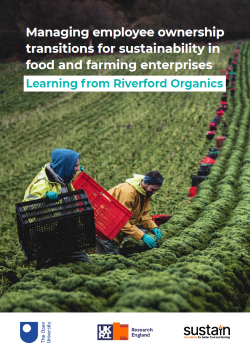You are here
- Home
- Publication
- OU report highlights benefits of Employee Ownership for sustainable food and farming
OU report highlights benefits of Employee Ownership for sustainable food and farming

A new report from The Open University, in collaboration with Riverford Organic Farmers and Sustain, explores how employee ownership can address the complex challenges facing the food and farming sector.
The report, titled ‘Managing employee ownership transitions for sustainability in food and farming enterprises: Learning from Riverford’, delves into the case of Riverford Organic Farmers, an organic farming and vegetable box delivery company that successfully transitioned to 100% employee ownership in 2023.
Professor Emma Bell and Dr Charles Barthold from The Open University’s Faculty of Business and Law carried out the research, which examines the key factors that contribute to successful employee ownership implementation. The report covers governance, culture, change management, and leadership, providing valuable insights for businesses considering this model.
The report also highlights the potential benefits of employee ownership for policymakers and says that by supporting and promoting this model, governments can contribute to a more equitable, sustainable, and resilient food system.
Emma Bell, Professor of Organisation and Leadership at The Open University, who led the research, said:
Riverford’s experience illustrates how employee ownership can be a powerful tool for building a sustainable and resilient food system. Our research highlights the importance of careful planning and a focus on employee engagement throughout the transition process into employee ownership.
“By fostering a shared sense of ownership and purpose, employee ownership can empower food and farming businesses to make long-term decisions that balance environmental, social and economic sustainability.”
Will White, Sustainable Farming Coordinator at Sustain, added:
Employee ownership offers a powerful business model that aligns perfectly with the principles of agroecology. By giving employees a stake in the business, EO enables companies to maintain their commitment to sustainable practices, ensuring that core values around environmental stewardship, fair labour, and local food systems are preserved over the long term.
“This model not only supports business resilience but also fosters innovation and collaboration, creating the right conditions for agro-ecological enterprises to thrive while staying true to their mission.”
The full report is available here at the Sustain website: Managing employee ownership transitions for sustainability in food and farming enterprises: Learning from Riverford.
This article was originally published on OU news, read the original article.
Upcoming Events
Student Hub Live: SHL End-of-year party!
Tuesday, June 24, 2025 - 19:00 to 20:00
Online with Student Hub Live
